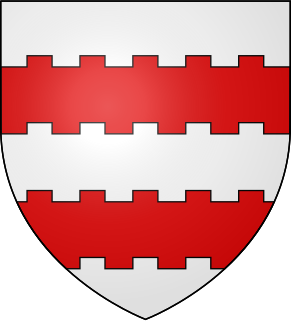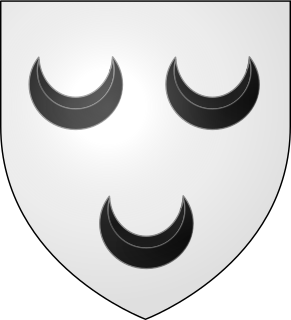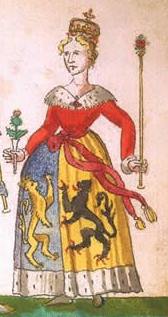 W
WMaria van Arkel was the only daughter and heiress of Lord John V of Arkel and Joanna of Jülich. She inherited the title to Gelderland from her maternal uncle, Duke Reginald IV, and her son became Arnold, Duke of Gelderland. She was the paternal grandmother of Mary of Guelders, who became Queen of Scots.
 W
WBeatrice of Falkenburg, also referred to as Beatrix of Valkenburg, was the third spouse of Richard of Cornwall, and as such nominally queen of Germany. She was 15 years old when she married the 60-year-old English prince, who proved to be a very devoted husband. In spite of the difference in their ages, Beatrice survived him by only five years, dying in England aged 23.
 W
WCatherine of Cleves was Duchess of Guelders by marriage to Arnold, Duke of Guelders. She acted as regent of Guelders during the absence of her spouse in 1450. The Hours of Catherine of Cleves was commissioned for her.
 W
WCatherine of Guelders, was regent of the Duchy of Guelders between 1477 and 1492. First for her brother during his absence, and then for her nephew.
 W
WGeertruy Haeck-van Slingelandt van der Tempel was a 15th-century Dutch patrician woman.
 W
WJohanna van Polanen was a Dutch noblewoman. She was the daughter of John III of Polanen, Lord of Breda, and his wife, Odilia of Salm. The House of Polanen was a side branch of the still existing House of Wassenaer.
 W
WLidwina (1380-1433) was a Dutch mystic who is honored as a saint by the Catholic Church. She is also thought to be one of the first documented cases of multiple sclerosis.
 W
WMargaret of Guelders was a noblewoman from what is now the Netherlands. She was part of the Egmond Family. She was married to the Count Palatine of Simmern and was the Countess of Palatinate-Simmern.
 W
WMary of Guelders was the queen of Scotland by marriage to King James II of Scotland. She ruled as regent of Scotland from 1460 to 1463.
 W
WAleid of Poelgeest was the mistress of the Count of Holland, Albert I of Bavaria.
 W
WThe Princess of Zweeloo or Zweeeloo Princess was a 5th-century woman whose grave was found in 1952 in Zweeloo, Coevorden municipality, Drenthe province, Netherlands. Her nickname comes from the richness of the grave goods found in her grave.
 W
WBeatrix de Rijke, was a Dutch foundling in Dordrecht in 1421.